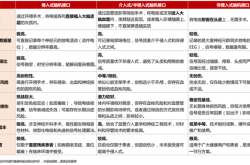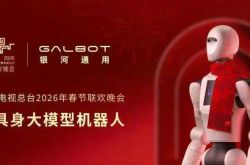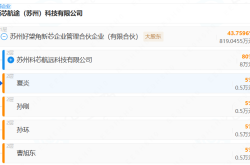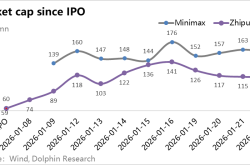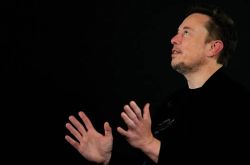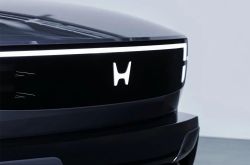Great Wall Motor: Rival's normal pressure fuel tank models have been discontinued, bringing an end to BYD's emissions scandal?
![]() 10/21 2024
10/21 2024
![]() 612
612
On October 18, Great Wall Motor issued another statement claiming that the sales of hybrid models equipped with normal pressure fuel tanks have been halted.

On the same day, Wei Jianjun, Chairman of Great Wall Motor, tweeted: "China's automotive competition is fierce, but Great Wall Motor adheres to rules and regulations, striving to promote the healthy development of the industry. Life should have a vast wilderness to gallop, and enterprises must move forward on the right track. Great Wall vows to continue striving for the dream of becoming a powerful automotive nation."
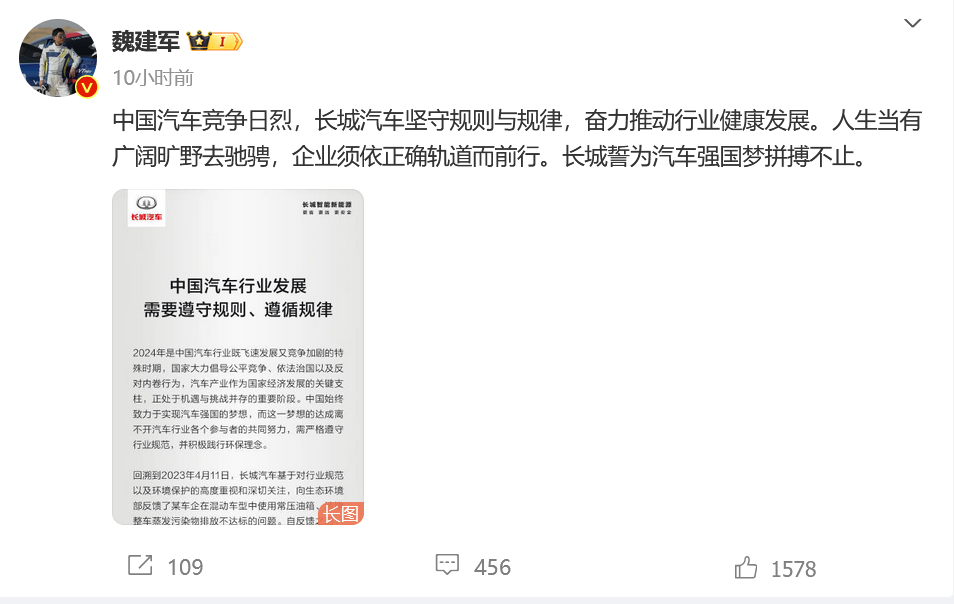
Public information shows that on May 25, 2023, Great Wall Motor issued a statement claiming that it had submitted a report to the Ministry of Ecology and Environment, the State Administration for Market Regulation, and the Ministry of Industry and Information Technology on April 11, accusing BYD's Qin PLUS DM-i and Song PLUS DM-i models, which use normal pressure fuel tanks, of suspected non-compliance with vehicle evaporative emissions standards. This report by Great Wall Motor caused a significant uproar in the industry.

In response to Great Wall Motor's public report, BYD issued a statement stating, "We firmly oppose any form of unfair competition! And reserve the right to legal proceedings!" At the same time, BYD believed that the process by which Great Wall Motor submitted the vehicles for testing was not standardized and emphasized that the products and related tests complied with national standards and had been certified by national authoritative institutions.
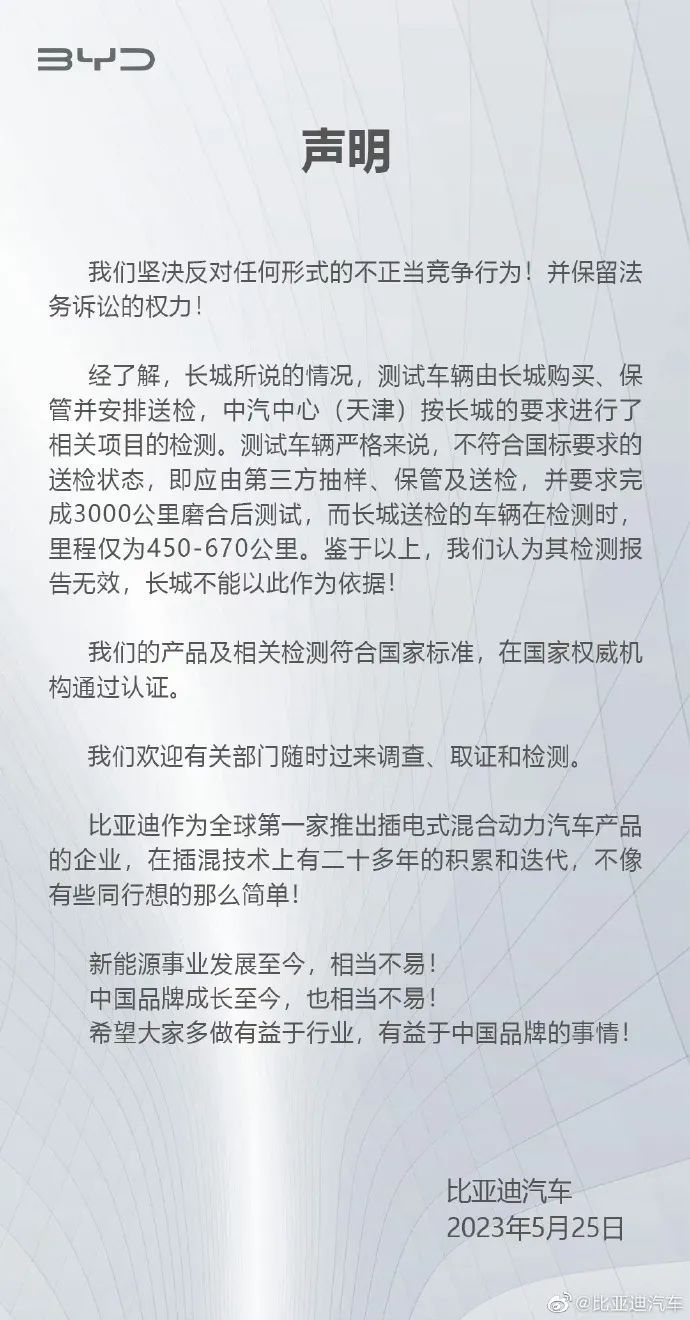
Soon, other automotive brands became embroiled in this dispute. On the night of May 25, 2023, Li Xiang, CEO of NIO, tweeted, "The high-pressure fuel tank for the NIO ONE was developed by a Korean company. At that time, there were no domestic suppliers capable of developing high-pressure fuel tanks. Many experts at the time did not understand why a metal high-pressure fuel tank was used and were criticized for a long time... For the L series, we supported a domestic enterprise in successfully developing a high-pressure fuel tank through joint research and development, and located the manufacturing plant next to our Changzhou factory."
Li Xiang's statement seemed to be telling the outside world that all of its hybrid models use high-pressure fuel tanks, not normal pressure ones. This was essentially a direct response to Great Wall Motor's report.
Subsequent public reports revealed that apart from BYD, which used normal pressure fuel tanks in its hybrid models, all other brands used high-pressure fuel tanks. As a result, this debate began to spread throughout the automotive market.
On May 29 of that year, an investor asked BYD on the Shenzhen Stock Exchange's interactive platform whether BYD's use of normal pressure fuel tanks could achieve compliant evaporative emissions.
BYD responded that it was possible. BYD's DM-i, a dual-motor series-parallel architecture based on an electric vehicle platform, decouples the engine and wheels, allowing the engine to start flexibly in EV mode, and fuel vapor to desorb freely from the carbon canister. Coupled with a multi-control unit coordination strategy and in-depth research on carbon canister characteristics, BYD independently developed fuel vapor emission control technology for normal pressure fuel tanks that complies with evaporative emission regulations.
This technology enables PHEV vehicles to automatically start the engine before the carbon canister becomes saturated, even if the vehicle is used in EV mode for an extended period. The problem can be resolved in about 4 minutes, without increasing fuel consumption or noise, and can complete fuel vapor desorption, vehicle power generation, and engine maintenance, which is both reasonable and compliant with regulations.
However, BYD's response did not alleviate people's concerns. For a long time afterward, various investigations and reports emerged regarding this incident, but the truth remained elusive due to the lack of a clear stance from relevant national departments.
A year later, in July 2024, at the 2024 China Automotive Summit Forum, Yang Xueliang, Senior Vice President of Geely Holding Group, publicly commented, "Regarding the widely discussed normal pressure fuel tank technology and the resulting controversy over emission compliance, I firmly believe that under rigorous legal scrutiny, a fair, transparent, and indisputable ruling will emerge, revealing the truth. At the same time, we must also face up to the inadequacies of the current legal supervision mechanism within the industry. Those underhanded criticisms and untruths will eventually disappear as the system improves."
Concurrently, Li Shufu, Chairman of Geely Holding Group, delivered a public speech stating, "The healthy development of any industry must demonstrate good economic returns in terms of input-output ratios. Endless internal competition and simplistic price wars often lead to cutting corners, counterfeiting, and non-compliant and disorderly competition."
These consecutive statements by Yang Xueliang and Li Shufu once again brought the debate between high-pressure and normal pressure fuel tanks back into the spotlight.
This means that the "report" incident, which occurred in April 2023, did not receive any response from the three national ministries and commissions—the Ministry of Ecology and Environment, the State Administration for Market Regulation, and the Ministry of Industry and Information Technology—until July 2024, a full year and three months later. In other words, for such a significant case involving environmental emissions, the relevant national departments and regulatory authorities remained conspicuously silent, which was somewhat unusual.
As a "competitor" and a third-party observer outside of this entire episode, Geely Automobile unabashedly brought up the matter in public, making its stance clear. This phenomenon is quite rare in the automotive industry.
This time, Great Wall Motor once again raised the issue of "normal pressure fuel tanks" and clearly stated that hybrid models equipped with normal pressure fuel tanks are no longer available on the market. This implies that even though BYD claims its normal pressure fuel tanks meet emission standards, it has still chosen to abandon them in favor of high-pressure fuel tanks.
So, did BYD switch to high-pressure fuel tanks due to public pressure, or were there indeed issues with the emission standards of its normal pressure fuel tanks? Our judgment is that without relevant investigations by the authorities, people may never know the answer.
Public data shows that in June 2020, BYD launched the DM-p and DM-i platforms. Relying on its fourth-generation DM-i super hybrid technology, BYD achieved significant sales growth, reaching 427,000, 721,300, and 1,868,500 vehicles sold from 2020 to 2022, respectively, becoming a leader in the industry. Among them, the implicated models, BYD Song DM-i and Qin DM-i, contributed significantly to sales. According to China Business Network, high-pressure fuel tanks typically add around 500 yuan in material costs, and some joint venture automakers may reach around 1,000 yuan.
According to public reports, on September 18, 2015, the U.S. Environmental Protection Agency accused Volkswagen of installing software specifically designed to detect when vehicles were undergoing emissions testing and secretly activate them during tests, allowing the cars to pass with "high environmental standards." However, during normal driving, these vehicles emitted significantly more pollutants, up to 40 times the legal limit in the United States.
On June 13, 2018, in response to Volkswagen's "Dieselgate" scandal, the Braunschweig prosecutor's office in Germany imposed a fine of 1 billion euros on Volkswagen. Volkswagen accepted the fine and took responsibility that day. On April 6, 2020, the UK High Court ruled that Volkswagen's use of "defeat devices" to make diesel emissions "compliant" with EU standards was illegal.
On September 3, 2024, nine years later, Martin Winterkorn, the 77-year-old former CEO of Volkswagen, appeared in court in Germany to defend himself against several criminal charges, with the trial expected to last 12 months. Winterkorn and four others were charged with fraud in 2019 for equipping Volkswagen vehicles with emissions cheating technology. Reports indicate that if convicted, Winterkorn faces up to 10 years in prison.
So, does Great Wall Motor's latest statement bring an end to this "emissions scandal" in China?

